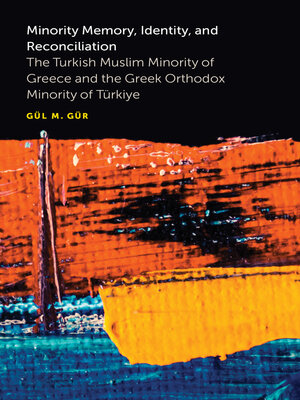Minority Memory, Identity, and Reconciliation
ebook ∣ The Turkish Muslim Minority of Greece and the Greek Orthodox Minority of Türkiye · Ethnic Conflict: Studies in Nationality, Race, and Culture
By Gül M Gür

Sign up to save your library
With an OverDrive account, you can save your favorite libraries for at-a-glance information about availability. Find out more about OverDrive accounts.
Find this title in Libby, the library reading app by OverDrive.



Search for a digital library with this title
Title found at these libraries:
| Library Name | Distance |
|---|---|
| Loading... |
Migration and minority rights are increasingly at the forefront of global discourse. Minority Memory, Identity, and Reconciliation explores the lives of two often overlooked minority communities: the Greek Orthodox minority in Istanbul, Türkiye, and the Turkish Muslim minority in Western Thrace, Greece. As empires dissolved, the leaders and political elites of new, smaller nations that emerged embarked on population exchanges to increase the ethnic and religious homogeneity of their nation-states. Although these two minority communities differ in religious, ethnic, and socioeconomic terms, they both offer unique perspectives on what happens to people who live on what is perceived as the wrong side of an arbitrarily drawn border.
Drawing from the personal stories of members of these two minority communities regarding their struggle with displacement, discrimination, and cultural assimilation, as well as comprehensive historical analysis, this book examines how historical traumas, national policies, and sociopolitical dynamics have influenced contemporary minority memory and identity formation. By incorporating interviews with community leaders, civil society representatives, and state officials, this book offers a rich, multifaceted perspective on the processes of memory and identity formation that underscores the broader implications of these processes for international relations in the region and minority rights. Gül M. Gür pulls together theories of nationalism, collective memory, and narrative practice to highlight the unique process of minority memory work and its role in sustaining minority identity and their advocacy efforts.
Drawing from the personal stories of members of these two minority communities regarding their struggle with displacement, discrimination, and cultural assimilation, as well as comprehensive historical analysis, this book examines how historical traumas, national policies, and sociopolitical dynamics have influenced contemporary minority memory and identity formation. By incorporating interviews with community leaders, civil society representatives, and state officials, this book offers a rich, multifaceted perspective on the processes of memory and identity formation that underscores the broader implications of these processes for international relations in the region and minority rights. Gül M. Gür pulls together theories of nationalism, collective memory, and narrative practice to highlight the unique process of minority memory work and its role in sustaining minority identity and their advocacy efforts.







